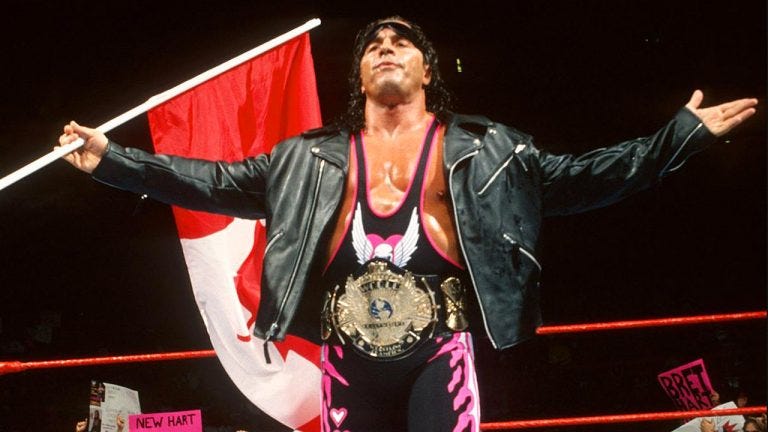Bret Hart’s WCW Run Was a Masterclass in Wasted Talent
How WCW turned a golden opportunity into one of wrestling’s biggest disappointments
Bret “The Hitman” Hart should have been WCW’s ace in the hole. His arrival in late 1997 was the kind of game-changing moment most promotions dream about. The World Wrestling Federation had just committed the ultimate betrayal in the infamous Montreal Screwjob, and Bret Hart’s real-life anger, disillusionment, and sense of injustice were the hottest storyline fuel on the planet.
He didn’t need a reinvention. He didn’t need a new gimmick. Bret Hart walked into WCW carrying one of the most explosive wrestling stories in history, and all they had to do was let him tell it. Instead, they botched it. Horribly. Repeatedly. Until all that remained was a legend wandering aimlessly through bad booking and backstage politics.
Let’s start with the obvious. Bret Hart wasn’t just a good wrestler he was the guy. A ring general with psychology for days, a legitimate aura, and a connection to fans that had only grown stronger with the controversial way he exited WWF. This was a guy who had just gone toe-to-toe with Steve Austin in one of the greatest WrestleMania matches of all time. His work in 1997 was arguably his best. He was cutting real, passionate promos and redefining what it meant to be a villain who thought he was the hero a Canadian icon standing tall against an increasingly edgy and chaotic American product.
When he left WWF, fans didn’t just follow him out the door. They ran. Because they believed in Bret Hart. And what did WCW do with that loyalty and heat?
They made him a referee. At Starrcade 1997. In his WCW debut. On their biggest show of the year. After months of speculation and one of the most hyped acquisitions in wrestling history, Bret Hart was reduced to counting a pinfall in a messy finish that already had fans groaning. That should’ve been a signal of things to come because if you thought that was underwhelming, buckle up.
Instead of igniting the red-hot NWO vs Bret Hart feud that was sitting on their lap, WCW refused to commit. They couldn’t decide if he was anti-NWO or part of it. Babyface or heel. Outsider or insider. They booked him like a background character in a company that desperately needed fresh direction.
Bret floundered in feuds with guys like Curt Hennig and Booker T not bad matches by any means, but they weren’t headline programs. There was no main event buzz. He was kept out of the spotlight during peak moments, and when he finally did win the WCW World Heavyweight Title, it felt like a footnote, not a coronation.
The title reigns meant nothing. The creative direction was nonexistent. While WWF was setting the industry on fire with Stone Cold, The Rock, DX, and Vince McMahon playing the most hateable boss in history, WCW was stuck running in circles, not knowing what to do with one of the greatest performers ever handed to them.
And it wasn’t just bad booking it was complete creative paralysis.
Think of the dream matches they fumbled. Bret Hart vs Sting should have been a modern-day clash of wrestling icons. Bret Hart vs Ric Flair could have revisited their WWF days in a major way. Bret vs Goldberg had the potential to elevate Goldberg’s in-ring credibility while giving Bret one last defining rivalry.
Instead, all of them felt rushed, hollow, or straight-up boring.
The turning point or rather, the final nail came with Goldberg. In late 1999, during a match that never should’ve been booked without precautions, Goldberg delivered a stiff kick to Bret’s head that resulted in a severe concussion. Bret continued to wrestle through it for a while, not fully realizing the long-term damage it had done. Eventually, it led to post-concussion syndrome and forced him into early retirement.
Was it Goldberg’s fault entirely? No. But WCW’s reckless booking and failure to protect one of their top stars sealed the deal. Bret was never the same again. The man who had given decades of excellence to professional wrestling was unceremoniously pushed aside, his legacy in the company reduced to a sad series of “what could’ve been” moments.
And let’s not ignore the elephant in the ring Eric Bischoff and the boys running the asylum. WCW’s biggest problem was its inability to follow through on anything. Long-term storytelling? Nonexistent. Logical character progression? Forget it. The company was being run on impulse, egos, and quick ratings grabs. Bret Hart wasn’t a flavor-of-the-month guy. He was a slow-burn storyteller, someone who needed weeks and months of nuanced buildup to get the most out of his programs. WCW had no time for that.
They were too busy letting the NWO drown in its own bloat, turning once-dangerous rebels into goofball midcarders with too many logos and not enough substance. And Bret? He became a prop in that circus. A lost legend in a sea of wasted talent.
By the time WCW tried to reboot his character, it was already over. Injuries piled up. Momentum was long gone. Bret’s WCW swan song was less of a final chapter and more of a slow fade to black.
When people talk about wasted potential in wrestling, they often point to guys who never got a shot. But Bret Hart got the shot. He walked into WCW as the hottest name in wrestling, and the company fumbled it at every possible turn. It wasn’t just poor execution. It was a full-blown disaster.
Wrestling fans deserved better. Bret Hart deserved better. And WCW, for all its success in the Monday Night Wars, will forever be remembered as the company that had the Hitman at his most compelling… and utterly wasted him.



